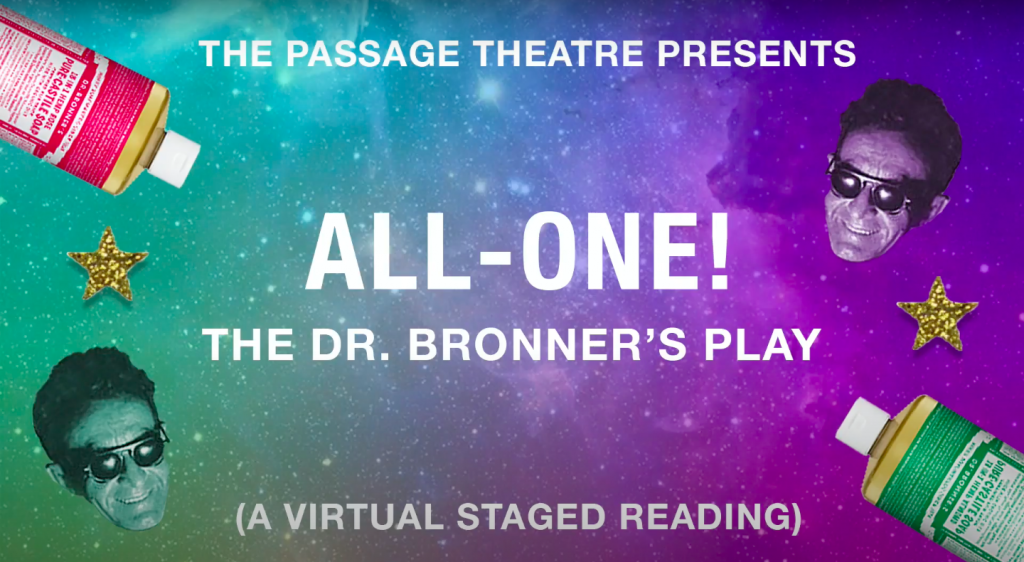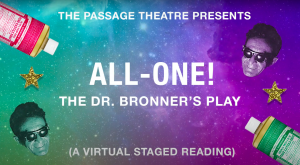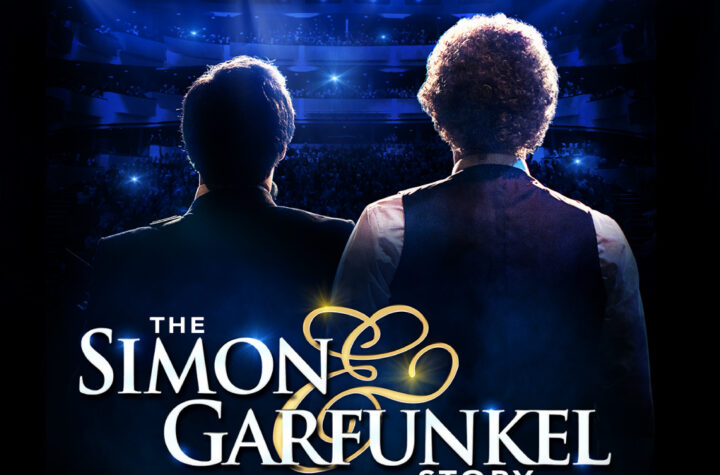
NOTE: This is a reading, not a play thus there is no rating by Julia. There was a discussion after, and it seems as all agreed that this was just that. However, those who are seeking entertainment should take the opportunity to see this.
 Awash with facts about Dr. Emanuel Bronner’s magic soap, the world premiere of the virtual staged reading of “All-One! The Dr. Bronner Play” is currently available online on Vimeo through Sunday, May 10th. The show, brought to us by the Passage Theatre, tells the story of the soap company’s legendary founder and his singular “All-One!” religious philosophy of Poetry-Unity-Ecstasy-Love printed on the labels of his pure-castile product. Beth Hyland, the playwright, has framed the narrative around eighteen different uses of Dr. Bronner’s liquid soap listed on varieties of the 32-ounce bottle. Each of these uses is demonstrated one at a time by a cast of ten performers, known to us as The Ensemble. What a most perfectly-timed and themed production during a worldwide pandemic, when all of us are constantly reminded to wash our hands—and of course, with soap and water!
Awash with facts about Dr. Emanuel Bronner’s magic soap, the world premiere of the virtual staged reading of “All-One! The Dr. Bronner Play” is currently available online on Vimeo through Sunday, May 10th. The show, brought to us by the Passage Theatre, tells the story of the soap company’s legendary founder and his singular “All-One!” religious philosophy of Poetry-Unity-Ecstasy-Love printed on the labels of his pure-castile product. Beth Hyland, the playwright, has framed the narrative around eighteen different uses of Dr. Bronner’s liquid soap listed on varieties of the 32-ounce bottle. Each of these uses is demonstrated one at a time by a cast of ten performers, known to us as The Ensemble. What a most perfectly-timed and themed production during a worldwide pandemic, when all of us are constantly reminded to wash our hands—and of course, with soap and water!
Originally commissioned to be an on-stage play, the script was revamped two weeks after rehearsals began in the face of the COVID-19 pandemic and the ban on live theatre in Chicago. With director Sammy Zeisel’s making the decision that “The show must go on!”, substantial adjustments had to be made so that the cast and the production team could safely work from home. For the performers, this meant learning to use Zoom and to look into a camera lens rather than into the eyes of fellow cast members and those of a live audience.
The story took a detour on its way to Zoomland when members of The Ensemble—made up of Jen Allman, Ned Baker, Carter Caldwell, Nico Kruger, Abby Pajakowski, Deanalís Resto, Will Sonheim, Joolz Stroop, Allyce Torres, and Park Williams—got to add their own creative material to Hyland’s script as they worked remotely. The result is a sequence of interactive Zoom boxes in combination with a series of vignettes—sometimes loosely tied together, sometimes disjointed—often displaying new and creative ways for cleaning and cleansing. One of the funniest examples is when Baker is in a bathtub fully clothed and is doing his laundry while wearing it. Another highlight is when Caldwell, referring point blank to the COVID-19 epidemic, washes his windows while looking outdoors and mulling over the current situation. “I know my neighbors are watching me,” he says. “Do I have a good enough reason to be outdoors?” Then he thanks us (the video audience) for watching him.
But there are too many times when the actors riff and the show becomes much too diffuse and ineffectual. Under the banner of “All-One!”, the cast has included almost anything remotely related to the subject of clean, e.g., ablutions, obsessive-compulsiveness, smells, lack of cleanliness, the lack of physical perfection of one’s body that soap cannot wash away, etc. There are moments when everything feels too much like a free-for-all, especially the clip about the King Spa, in Niles, Illinois.
With so much deviation from the original script, what gets lost is much of Dr. Bronner’s biography: his beliefs, his travels, his angst, and his commercial success in marketing his all-natural (now organic) product, which gained popularity with the “back to nature” movement in the 1960s. Young people of the Woodstock Generation—campers, “hippies”, urban pioneers, etc.—turned to alternative products not made with harsh chemicals; unlike their parents, whose “New and Improved” detergents made up a previous generation of clean in the 1940s and 1950s.
“All-One! The Dr. Bronner Play” is therefore a story not just about cleaning but about a Jewish émigré from Heilbronn, Germany, born in 1908, who emigrated to Milwaukee, Wisconsin, in 1929, and subsequently built a well-established company in his adopted country of America. Though economically successful, he always carried tremendous feelings of guilt that he hadn’t tried hard enough to convince his parents to leave Germany when the Nazis first came to power in 1933. Like a lot of Jews of that era, his mother and father thought that Hitler and Nazism would simply blow over. By 1941, when the proverbial handwriting was on the wall and they finally wanted to escape, it was much too late—and they were sent off to concentration camps and killed at Auschwitz. Their deaths, the Holocaust, and the early loss of his first wife made Dr. Bronner extremely grief-stricken and depressed. He felt the weight of the world on his shoulders. How could he get past his personal pain and the tyranny of his existence? Dr. Bronner grew up Jewish in an Orthodox family. It’s hard enough being secular or nominally religious when life gives you a bad hand; but for someone like Dr. Bronner, who had been brought up strictly orthodox, perhaps it is even harder to believe that God has forsaken His people. So how could he make sense of this? How could he cope with the loss of his loved ones? How could he atone for the fact that he didn’t make his message stronger? How could he make his life matter while making the world a better place?
The secret was in the magic of his invented “All-One!” faith, where he proclaims on every bottle of his 18 in 1 pure-castile soap that we are all one people “on this spaceship earth” and that spiritual masters in every religion are united in promoting the goodness and well-being of all mankind. His philosophy combines the teachings of Jesus, Rabbi Hillel, Mohammad, the Buddha, and other religious figures with the belief that each and every human being is capable of unifying the planet in peace and love—if we were only to listen to our hearts and to hear this important message of Oneness! For him, soap became the magical formula that bridged the earthly plane and the spiritual one. His one-of-a-kind labels gave voice to important rules for living as they shouted out the sacredness of the number eighteen, which, in Judaism, is the holy and mystical number that represents life.
Except for the heartfelt dramatic climax near the end, the presentation largely minimizes too many serious components of the man’s life and his mission in favor of funnier, flashier scenes created by The Ensemble. By delaying an essential portion of the narrative, we miss Dr. Bronner’s motivation for action earlier on in the story. By interspersing Dr. Bronner’s personal history in so many bits and pieces, the revised script dilutes the power of his biography. Also problematic is the lack of consistency when different people play Dr. Bronner in different scenes. These things put together serve to deflate our emotions, when they could have been raised to a fevered pitch. Above all, when the more spiritual aspects of the story are subsumed to the mundane, we lose much of Dr. Bronner’s magic. It is a magic where we learn to feel good about ourselves as we experience the joy and meaning of life.
That said, the magic of streaming video has put this serendipitous production into the hands of a remote audience. Using Zoom and Vimeo has consequently become a highly innovative way to incorporate new and different ways of storytelling—and new and different ways of experiencing theatre.
Dr. Bronner died in 1998. During his lifetime, his son took over the company and later his grandson. Some have called him a genius, while others have thought of him as crazy (with his commitment at one time to the Elgin Mental Hospital). What most can agree on is that he was an eccentric. In the process of healing himself from his psychological trauma, he was driven to bring about world unity and spread the gospel of his “All-One!” faith—with his work being the best antidote for his suffering. His life and times thus make for a fascinating character study. But as director Zeisel explains, “We’ll never really understand who Dr. Bronner was. But it was fun to try.”
“All-One! The Dr. Bronner’s Play”, A Virtual Staged Reading by Beth Hyland and The Ensemble, is available for streaming through May 10, 2020.
Pay-what-you-can tickets are currently available at www.thepassagetheatre.com.
To alleviate the financial struggle that artists are currently facing, 50% of the proceeds will go directly to the artists involved. Please consider an additional donation to help keep Chicago theatre alive during these uncertain times.
For more information on The Passage Theatre, visit www.thepassagetheatre.com.
.






More Stories
“The Simon & Garfunkel Story”
“Women Beware Women”
“Barefoot in the Park”